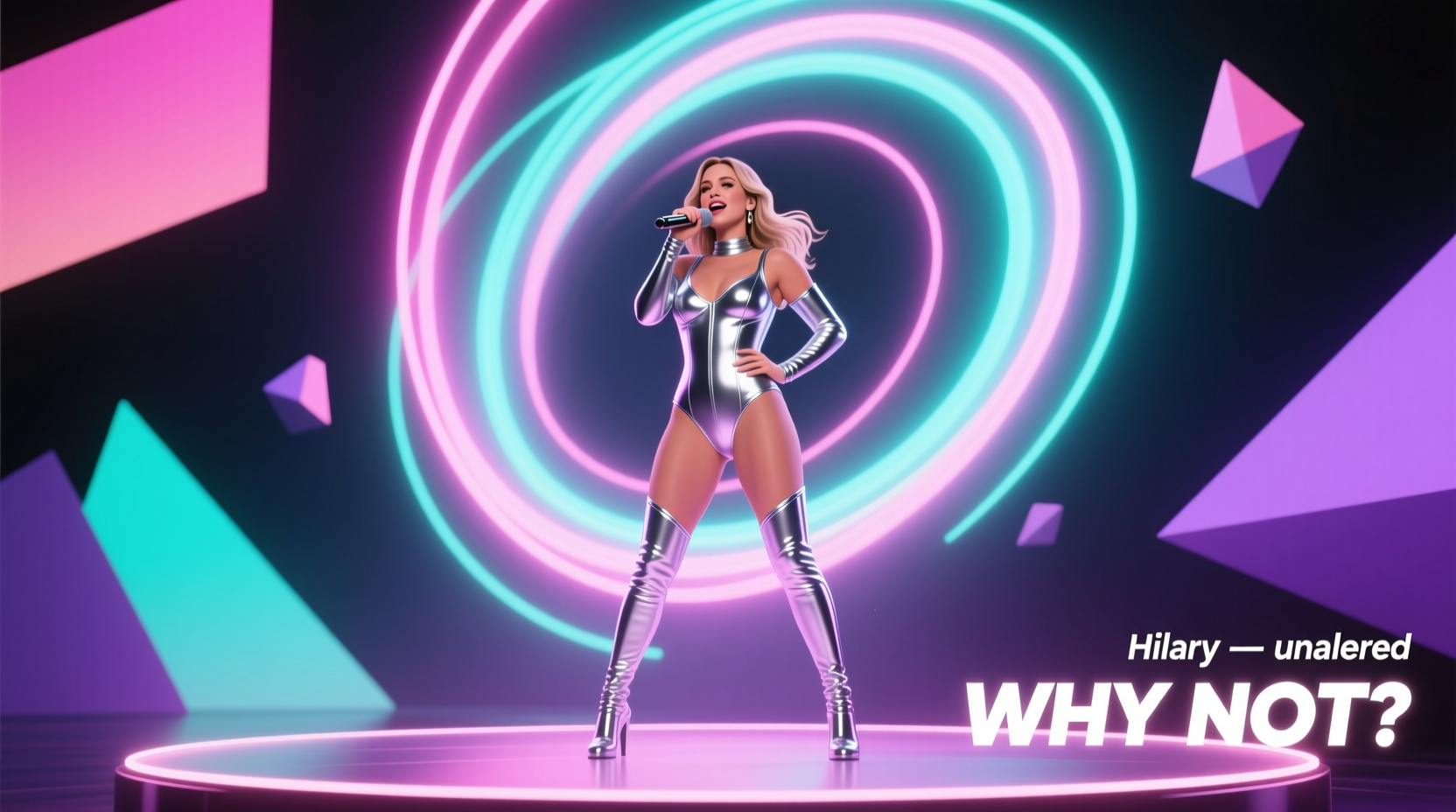Released in 2003 as part of her debut album *Metamorphosis*, Hilary Duff’s “Why Not” may have been dismissed by some as a lightweight pop track aimed at teenagers. But beneath its upbeat tempo and catchy chorus lies a quiet manifesto of self-worth, confidence, and defiance against self-doubt. Far from being just another bubblegum pop tune, “Why Not” functions as a subtle yet powerful anthem—one that encourages listeners to embrace their potential, challenge insecurity, and step boldly into who they are meant to be.
The song arrived at a pivotal moment in Duff’s career, as she transitioned from Disney Channel star to mainstream pop artist. In that context, “Why Not” wasn’t just a song—it was a declaration of independence, a personal motto wrapped in melody. Over two decades later, its message continues to resonate with fans navigating identity, ambition, and the internal barriers that hold them back.
The Origins of a Quiet Anthem

Co-written by Duff alongside Kara DioGuardi and John Shanks, “Why Not” emerged during a period when young celebrities were expected to conform to carefully managed images. Duff, already famous for her role in *Lizzie McGuire*, used the track to assert her voice beyond the confines of a scripted character. The lyrics—simple but direct—ask a deceptively profound question: Why not believe in yourself? Why not take the risk? Why not go after what you want?
What sets “Why Not” apart from other coming-of-age pop songs is its understated courage. It doesn’t scream empowerment; it whispers possibility. Lines like “I might get rejected, yeah / But I’ll bet I get accepted” acknowledge fear while refusing to be ruled by it. This balance between vulnerability and determination gives the song emotional authenticity that transcends age and era.
Lyrics That Challenge Inner Criticism
A close reading of the lyrics reveals a narrative arc rooted in personal growth. The first verse introduces uncertainty: “Sometimes I feel like I don’t know myself.” This introspection mirrors the confusion many feel during adolescence—or any major life transition. But rather than dwell on insecurity, the chorus pivots toward action: “Why not do it? Why not now?”
This rhetorical shift is intentional. By posing the question “Why not?” Duff reframes obstacles as opportunities. The phrase becomes a tool for dismantling mental barriers. It doesn’t demand perfection or guarantee success—it simply invites movement.
In a culture that often glorifies confidence without acknowledging the effort it takes to build it, “Why Not” validates the process. You don’t need to be fearless to begin. You just need to ask the right question.
“Empowerment isn’t always loud. Sometimes it’s a whisper that says, ‘Try anyway.’” — Dr. Lena Torres, Youth Psychologist & Author of *Growing Into Voice*
Why 'Why Not' Resonates Beyond Pop Culture
While “Why Not” never reached the chart-topping heights of Duff’s later single “So Yesterday,” its staying power lies in relatability. Teachers have used it in classrooms to spark discussions about goal-setting. Therapists cite it as a gentle introduction to cognitive behavioral techniques for teens struggling with anxiety. And fans continue to share stories online about how the song helped them audition for a play, apply for a job, or speak up in a relationship.
The universality of its message makes “Why Not” more than a nostalgic artifact—it’s a functional mindset tool. Unlike anthems that rely on bravado, this song works because it starts small. It doesn’t tell you you’re destined for greatness. It simply asks why you wouldn’t give it a shot.
Real-Life Impact: A Mini Case Study
Sophia M., then 14, was terrified of public speaking. After failing to deliver a book report in front of her class, she avoided raising her hand for months. One day, while listening to *Metamorphosis* on repeat, she fixated on the line, “Why not show them what I can do?” She began humming it before presentations. Then saying it aloud. By the end of the school year, she ran for student council—and won.
Years later, Sophia credits the song with helping her shift from avoidance to agency. “It wasn’t about becoming fearless,” she recalls. “It was about realizing that fear didn’t have to decide for me.”
Comparing Empowerment Anthems: What Makes 'Why Not' Unique?
| Song | Tone | Core Message | Approach to Confidence |
|---|---|---|---|
| Hilary Duff – “Why Not” | Hopeful, reflective | Take the first step despite doubt | Invitational (“Why not try?”) |
| Katy Perry – “Roar” | Defiant, bold | I’ve found my strength after struggle | Declaration (“I got the eye of the tiger!”) |
| Selena Gomez – “Who Says” | Reassuring, gentle | You’re worthy as you are | Affirmational (“Who says you’re not perfect?”) |
| Christina Aguilera – “Beautiful” | Vulnerable, sincere | Inner worth persists through criticism | Comforting (“You are beautiful no matter what they say”) |
As the table shows, “Why Not” stands out for its low-pressure invitation to act. While other anthems celebrate triumph or affirm identity, Duff’s song focuses on the threshold—the moment before action, when hesitation looms largest.
How to Use 'Why Not' as a Mindset Tool
The enduring value of the song lies not just in listening, but in applying its central question to daily life. Whether you're considering a career change, mending a relationship, or simply trying something new, “Why Not” offers a framework for overcoming inertia.
- Identify the hesitation: What are you avoiding? Name the fear (e.g., rejection, failure, judgment).
- Flip the script: Instead of asking, “What if I mess up?”, ask, “Why not see what happens?”
- Define a small step: Action doesn’t require grand gestures. Send the email. Make the call. Sign up.
- Accept uncertainty: The song doesn’t promise success—only permission to try.
- Repeat as needed: Confidence is built through repeated “why not” moments.
FAQ: Common Questions About the Song and Its Meaning
Was “Why Not” written by Hilary Duff herself?
Yes—Hilary co-wrote the song with established songwriters Kara DioGuardi and John Shanks. Her involvement in the writing process gave the lyrics a personal tone that reflected her own journey at the time.
Is “Why Not” considered a feminist anthem?
While not explicitly political, the song aligns with feminist values of self-agency and challenging limitations placed on young women. Its encouragement to act independently and believe in one’s capabilities resonates with broader themes of gender empowerment.
Why isn’t “Why Not” as widely recognized as other empowerment songs?
It lacked the massive radio push of follow-up singles like “Come Clean” or “So Yesterday.” Additionally, its quieter, introspective energy contrasts with louder, more dramatic anthems, making it easy to overlook—but also more sustainable as a personal motivator.
Conclusion: Turning a Pop Song Into a Personal Mantra
“Why Not” endures not because it changed music history, but because it changes mindsets. In a world saturated with pressure to be certain, successful, and polished, Hilary Duff’s early hit reminds us that growth begins with a simple question—one that costs nothing to ask but can change everything.
More than a song, “Why Not” is an invitation. To try. To fail. To keep going. It’s proof that empowerment doesn’t always arrive with fanfare. Sometimes, it arrives with a beat, a melody, and four words that quietly transform hesitation into hope.









 浙公网安备
33010002000092号
浙公网安备
33010002000092号 浙B2-20120091-4
浙B2-20120091-4
Comments
No comments yet. Why don't you start the discussion?